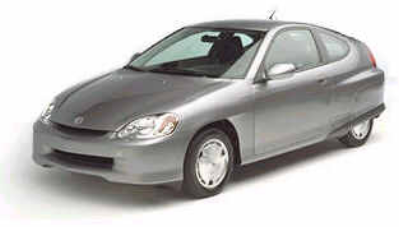Alternative Transportation
A lot of the press in Alternative Energy is devoted to automobiles, and for good reason. A large part of our energy consumption is used to get us from point A to point B.
Alternatives to fossil-fuel powered vehicles range from pure electric cars, to hybrid gasoline-electric, hybrid diesel-electric, bio-diesel, and hydrogen. Natural gas is also an alternative -- although it is a fossil fuel, it produces less carbon dioxide per mile than gasoline, and is fairly clean burning.
Pure electric cars are not easy to find, or in the case of the Wrightspeed or the Tesla or the Tango, are in the $100,000 and up range.

Hydrogen is still a fuel of the future, and may be for a long time. There are hydrogen fuel cell powered buses, vans, and minivans, but most of the hydrogen in use today comes from natural gas, and so qualifies as a fossil fuel. It is still cheaper to get hydrogen from natural gas than from solar or hydro powered electrolysis.

Hybrid gasoline-electric cars are becoming common these days, especially in Silicon Valley, where I live and work. The Prius, the Insight, the Highlander, the Lexus RX 400h, the Camry, the Escape, all can be seen speeding along in the car-pool lanes, their little "fuel efficient car" stickers proudly displayed. There are trucks with generators built-in that are claiming to be hybrid as well, but with much less impressive MPG ratings.
Bio-diesel, once a small niche, is expected to make bigger inroads in California when the clean burning, low NOX versions are allowed to be sold (coming soon). The waste from fast-food restaurants will no longer be able to supply the demand for fuel, and it is expected that bio-diesel pumps will start showing up at gas stations. Of course, these cars can also run on regular diesel if the renewable forms are not available.

 Hydrogen is still a fuel of the future, and may be for a long time. There are hydrogen fuel cell powered buses, vans, and minivans, but most of the hydrogen in use today comes from natural gas, and so qualifies as a fossil fuel. It is still cheaper to get hydrogen from natural gas than from solar or hydro powered electrolysis.
Hydrogen is still a fuel of the future, and may be for a long time. There are hydrogen fuel cell powered buses, vans, and minivans, but most of the hydrogen in use today comes from natural gas, and so qualifies as a fossil fuel. It is still cheaper to get hydrogen from natural gas than from solar or hydro powered electrolysis.
 Hybrid gasoline-electric cars are becoming common these days, especially in Silicon Valley, where I live and work. The Prius, the Insight, the Highlander, the Lexus RX 400h, the Camry, the Escape, all can be seen speeding along in the car-pool lanes, their little "fuel efficient car" stickers proudly displayed. There are trucks with generators built-in that are claiming to be hybrid as well, but with much less impressive MPG ratings.
Bio-diesel, once a small niche, is expected to make bigger inroads in California when the clean burning, low NOX versions are allowed to be sold (coming soon). The waste from fast-food restaurants will no longer be able to supply the demand for fuel, and it is expected that bio-diesel pumps will start showing up at gas stations. Of course, these cars can also run on regular diesel if the renewable forms are not available.
Hybrid gasoline-electric cars are becoming common these days, especially in Silicon Valley, where I live and work. The Prius, the Insight, the Highlander, the Lexus RX 400h, the Camry, the Escape, all can be seen speeding along in the car-pool lanes, their little "fuel efficient car" stickers proudly displayed. There are trucks with generators built-in that are claiming to be hybrid as well, but with much less impressive MPG ratings.
Bio-diesel, once a small niche, is expected to make bigger inroads in California when the clean burning, low NOX versions are allowed to be sold (coming soon). The waste from fast-food restaurants will no longer be able to supply the demand for fuel, and it is expected that bio-diesel pumps will start showing up at gas stations. Of course, these cars can also run on regular diesel if the renewable forms are not available.